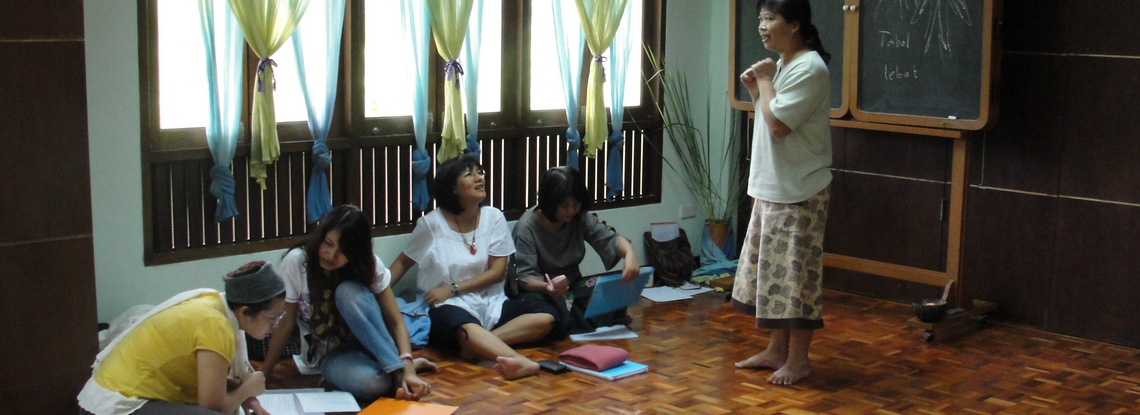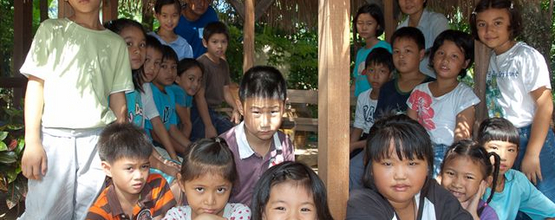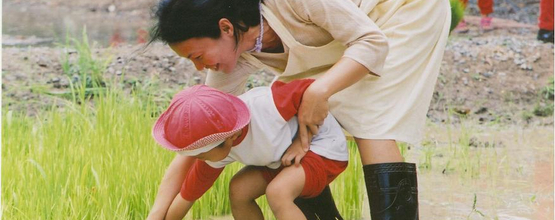Healthy Islands amidst the chaos
Bangkok, the country’s capital city, is a huge metropolis distorted by commerce. It currently seems that a rapid dissolution of traditional values in everyday life takes place. Therefore, it is considered modern, to give birth to most babies by caesarean section in a “clean” way, and breastfeeding and intimate physical contact between mother and child is being assigned to employed nurses. This will have fatal consequences for future generations.

However, also in Thailand, the need for open spaces for a healthy child development becomes more and more important for an ever-widening circle of educated young parents. Instead of focusing on cognitive performance at the earliest possible stage, there should rather be enough space for children to develop their human potential and this may be accompanied by caring love. The anthroposophical movement has settled right into this environment and is enjoying increasing popularity. For the parents, the opportunity to get together as a community and to assume the responsibility of developing a new school becomes a source of personal strength. This is especially important in an age in which the decisions about the welfare of ones child is left rather to “experts” and parents feel very uncertain in their own assessments about the welfare of their child. The anthroposophical movement in Thailand is a wonderful example of this phenomenon of a courageous alternative community, trying to build healthy islands amidst all the surrounding chaos. In Bangkok there are two large established Waldorf schools, where children from kindergarten through 12th Class are being taught. Both started out small and grew steadily with an increasing number of students. Founded in 1996, the Panyotai Waldorf School is the oldest Waldorf School in Bangkok, and is very committed to the preservation and care of the spiritual roots. One aim of the school is to connect anthroposophy with traditional cultural values and actively create something new. The second Waldorf School, the Tridhaksa School, also grows continuously since 2000. Approximately 250 students are currently attending the school, which holds social justice as one of its core principles. Therefore the school wants to be accessible to children coming from all kinds of backgrounds, even if the parents cannot afford the school fees of 100 € per month. Furthermore, the issue of the inclusion of children with special needs is being developed specifically. At the school there is already a special class, with fifteen children, who are taught according to their varying needs.
Another anthroposophical initiative that ventures into unexplored realm is the “Tonrak Foundation for Children with Special Needs,” since the spiritual and intellectual education of people with disabilities is not a common practice in Thailand. In this respect, there is a lot of information and public relations work that needs to be done to educate parents and teachers and to convince potential funders of the specific approa- ches of anthroposophic curative edu-cation. The aim is to build up a socio- therapeutic community. Just outside of Bangkok a property was donated and is now being used by the community of parents, teachers and friends, and of course by the young people themselves. For there dream of a socio-therapeutic community, they get involved, for ex- ample at the “Family Network”, a public radio station as well as at various universities and companies.
In addition, during the last three years, a pilot project emerged for a remedial education teacher training. This was implemented in collaboration with the Johanna Russ School in Siegen and the Friends of Waldorf Education. Fifteen participants from Thailand and Singapore, dealt with the meaning of teaching and pedagogical issues, practiced child discussions, came up with ideas for a funding plan and enjoyed the variety of artistic activities.
After the military coup in Thailand in 2006, there were reoccurring political demonstrations, clashes and violence. The “I do not care” (Mai pen rai) attitude of people is gradually changing due to the political and economic changes. The last political crisis in 2010 has left deep wounds. What happened to our people, asks Anchana Soontornpitag, who is part of the Tonrak Foundation. Why can we not save ourselves by wisdom, clear thinking and an awakening awareness of our suffering, as Buddha has taught us once?
The political crisis of recent years shows that it is time to seriously and deeply think about how we teach children today, to live more consciously, more sustainable and self-determined. Thailand is rich and fertile, says Soontornpitag, but so far we have abused the country and failed to consider it as a living organism.
Thus, new structures and viable networks are currently developing for the future in Thailand.

Bangkok Panyotai
Thailand: Panyotai Waldorf School in Bangkok is the country’s first Waldorf School and its first alternative school ever. The school has grown steadily since…
Learn more
Bangkok - Tripat
Thailand: Tripat Waldorf School (formerly Tridhaksa) in Bangkok started its first school year in 2001 with a first class. Meanwhile the school enjoys a very…
Learn more